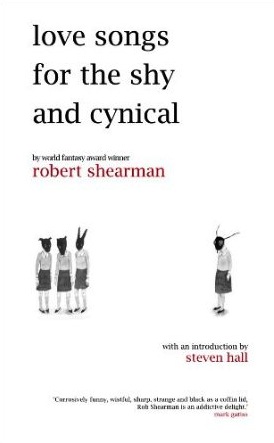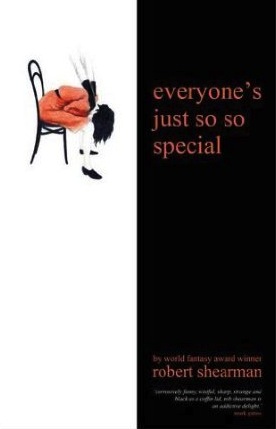
photo by Emiliano
In her essay, shortlisted for the 2014 THRESHOLDS International Short Fiction Feature Writing Competition, Carys Bray recommends the works of Robert Shearman.
*
Comments from the judging panel:
‘The writer deftly summarises Shearman’s career as a short story writer, giving us a taste of his stories and his style without retelling the stories themselves’; ‘a great tone with personal reflections as a writer’.
*
by Carys Bray
The first time I met Robert Shearman he was collecting a prize for his second collection, Love Songs for the Shy and Cynical. He was affable and friendly and he talked quickly, as if ideas were sliding straight from his brain to his throat. I hadn’t read any of his stories and I hadn’t met many writers, so I looked for clues to his fiction in his manner, and I came to the erroneous conclusion that his stories were jolly. I imagined page after page of ebullience and cheer; I wasn’t expecting horror. In fact, if anyone had asked before I read Shearman’s stories, I would have said horror wasn’t for me.
Shearman’s debut collection, Tiny Deaths, opens with ‘Mortal Coil’ the story of Harry Clifford, the only person in the world not to receive a card in the post, stamped with his name and a short account of when and how he will die. As people come to terms with the knowledge of the details of their deaths, Harry’s future remains uniquely uncertain. Soon, there’s a knock at the door and Harry makes the appalling discovery that, according to a stranger’s card, he is to be an instrument of death. Harry tries to be accommodating, but he struggles to cope with his role as murderer. After he has killed six people he escapes to Cornwall for a holiday, where he continues to be assailed by members of the public: ‘I do believe you’re supposed to push me off the cliff … I’m sorry … I can quite see how that would disturb your walk.’
 This story explores a what-if that is both humorous and horrifying, but by the time it concludes, the story has become something else entirely: a meditation on free will and predestination, and a reminder that, as Harry’s secretary notes, it is ‘a mistake to see in the way you die an explanation of how you live.’ This thoughtful and provocative ending is typical of Shearman who addresses big themes such as mortality, love and legacy with deftness, humour and an uncanny instinct for the darker side of human nature. Not only is he incredibly inventive when it comes to dreaming up what-ifs, he also has a talent for depicting the horror and absurdity of the mundane. This is particularly apparent in ‘Damned if You Don’t’, a story in which Martin finds himself in hell, where he’s forced to share a cell with Adolf Hitler’s dog, Woofie.
This story explores a what-if that is both humorous and horrifying, but by the time it concludes, the story has become something else entirely: a meditation on free will and predestination, and a reminder that, as Harry’s secretary notes, it is ‘a mistake to see in the way you die an explanation of how you live.’ This thoughtful and provocative ending is typical of Shearman who addresses big themes such as mortality, love and legacy with deftness, humour and an uncanny instinct for the darker side of human nature. Not only is he incredibly inventive when it comes to dreaming up what-ifs, he also has a talent for depicting the horror and absurdity of the mundane. This is particularly apparent in ‘Damned if You Don’t’, a story in which Martin finds himself in hell, where he’s forced to share a cell with Adolf Hitler’s dog, Woofie.
While Martin has been sent to hell for not believing in God, Woofie is there because he was kind to his master. As Woofie explains: ‘When he told me to fetch a stick, I was just following orders.’ It’s only in the concluding moments of the story that the reader becomes aware of a subtle transformation: Martin and Woofie, a fairly likeable, if somewhat insipid pair, have changed. Woofie finally confesses that, had he been able, he would have advised Hitler thus:
If you’re going to hell for one Jew, then why not for a hundred? For a hundred thousand. For six million. If you’re going to be damned anyway, at least be damned for something impressive.
The dog who was ‘just following orders’ is suddenly culpable, and an entertaining story with a sinister undercurrent has morphed into a meditation on the erosion of conscience and the banality of evil.
Not all of Shearman’s stories address such serious topics. There are occasions when he plays with language. He has a particular talent for upending comforting platitudes. In ‘Stuff We Leave Behind’, a husband’s dying words are: ‘This isn’t the end. I’ll be waiting for you.’ Such words should be comforting when uttered by a loved one, but what if they are uttered by someone who is secretly rather strange? Someone who has collected every card you’ve ever sent, every shopping list you’ve written, every item of clothing you’ve taken to the charity shop? In such circumstances, those very same words morph into a horrifying promise, which is exactly what happens in ‘Stuff We Leave Behind’.
Shearman’s stories are frequently funny. He has an ear for asinine, uncomfortable dialogue and an irreverence that allows him to broach any subject. His second collection, Love Songs for the Shy and Cynical, opens with ‘Love Among the Lobelias’, a story about what happens when the Devil’s romance novel is accepted for publication. Unfortunately, everyone who reads the novel ends up in hell, which leads to copies of the book being sold with warning stickers: ‘These are the words of the Devil. Read and you’ll BURN in Hell!!!’ The warning attracts more readers, leaving the Devil to reflect on the act of writing: ‘He knew all stories were lies, but deep down, weren’t the best of them true as well?’ It’s a witty opening to a collection that’s full of impossible (lies) yet incredibly real (true) stories.
 Many of the stories in Love Songs for the Shy and Cynical deal with creativity and the imagination. In ‘Sweet Nothings’, a love-sick pig from the Garden of Eden composes the first love song in the world. In ‘Your Long Loving Arms’, unemployed Steve finds work as a tree on Clapham Common and becomes so conscientious that he is promoted to oak, something that’s ‘every sycamore’s dream’. For Steve, the pig and many other characters in this collection, the cost of creative passion is high. But the imagination is a redemptive force in ‘This Creeping Thing’, a story about love and cats. I don’t like cats. When I was a teenager I volunteered to feed my best friend’s cat during a holiday. The cat liked to pounce out at me and hiss. I made my dad accompany me but the sneaky cat pretended to be nice when other people were around. ‘This Creeping Thing’ sneaked past my felinophobia and as I read about prickly Susan (who never much wanted to love) summoning her pet from the grave, I felt her loss. It’s a gorgeous story about grief, the power of wishing and the ways in which we sometimes choose to be haunted by memories of the people and animals we love.
Many of the stories in Love Songs for the Shy and Cynical deal with creativity and the imagination. In ‘Sweet Nothings’, a love-sick pig from the Garden of Eden composes the first love song in the world. In ‘Your Long Loving Arms’, unemployed Steve finds work as a tree on Clapham Common and becomes so conscientious that he is promoted to oak, something that’s ‘every sycamore’s dream’. For Steve, the pig and many other characters in this collection, the cost of creative passion is high. But the imagination is a redemptive force in ‘This Creeping Thing’, a story about love and cats. I don’t like cats. When I was a teenager I volunteered to feed my best friend’s cat during a holiday. The cat liked to pounce out at me and hiss. I made my dad accompany me but the sneaky cat pretended to be nice when other people were around. ‘This Creeping Thing’ sneaked past my felinophobia and as I read about prickly Susan (who never much wanted to love) summoning her pet from the grave, I felt her loss. It’s a gorgeous story about grief, the power of wishing and the ways in which we sometimes choose to be haunted by memories of the people and animals we love.
Equally impressive is Shearman’s third collection, Everyone’s Just So So Special, a furious, whirlwind of a book. The stories in this collection are linked by a crazy historical rant which requires a magnifying glass to read. Nestled within the history is an italicised story that reads like an elaborate joke, until the reader is wrong-footed into contemplation by searing observations that illustrate the very human desire to be remembered and to be special. Shearman has been compared to Roald Dahl, and it is certainly easy to imagine him at his keyboard, dreaming up impossible and terrifying worlds, with all the faux contrition of Willy Wonka: ‘I’m joking,’ said Mr Wonka, giggling madly behind his beard. ‘I didn’t mean it. Forgive me. I’m so sorry!’
Cumulatively, Everyone’s Just So So Special is more surprising, disturbing and entertaining than Shearman’s previous collections. Individually, it contains many brilliant and memorable stories that will entertain and, quite frankly, bother the reader. Shearman has a homing-instinct when it comes to anxiety. Any parent who has ever placed a small child on Santa’s lap is aware that fear of the man in red appears to be primordial and is something that has to be unlearned as one grows up. That’s why ‘Cold Snap’, a story in which Santa makes an unsuspecting child sign a binding contract, is so frightening. ‘The Big Boys Big Box of Tricks’ is similarly chilling. Children’s magician the Great Miraculoso gets drawn into a display of magical one-upmanship with a precocious seven-year-old and the results are horrifying. But the beauty of Shearman’s stories is that they are not always horrifying; they are frequently tender, and when the reader begins a story, she is never quite sure which combination of horror and humanity will materialise.
‘Restoration’, is a tender, inventive story that approaches history, memory and the importance of recording the most significant things:
Don’t waste your efforts on all the unimportant stuff … That’s all gone now. But your wife, describe your wife, remind yourself that you too once loved and were capable of inspiring love back.
In ‘Without You, I Wouldn’t Be Alive’, a woman called Barbara works in a charity shop arranging the books. A man comes in looking for signed copies of books and, in an effort to please him, Barbara starts to write her own, fictional dedications in the stock: ‘All the reviews say this is the funniest book of the year. Do you remember when we used to laugh?’ It’s a story guaranteed to make a second hand book-lover’s heart sing. And, of course, there are playful stories, too: ‘Acronyms’ made me crave a BLT, prepared in exactly the way described.
Steven Moffat describes Shearman’s fiction as haunting and nightmarish yet ‘still somehow utterly recognisable thanks to the way he always picks out the comically mundane among the impossible and fantastical.’ I remember the surprise I felt as I read Tiny Deaths. I had never read anything quite like it. The short story form suddenly seemed bigger and more elastic; I was aware that it could do and be things that I hadn’t imagined – that I couldn’t imagine. I learned that I like horror, and fantasy, and romance, and in particular, the strange and wonderful fusion of genres I discovered in these stories.


